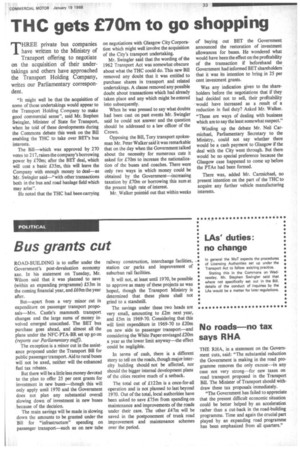Bus grants cut
Page 35

If you've noticed an error in this article please click here to report it so we can fix it.
ROAD-BUILDING is to suffer under the Government's post-devaluation economy axe. In his statement on Tuesday, Mr. Wilson said that it was planned to save (within an expanding programme) £53m in the coming financial year, and £69m the year after.
But—apart from a very minor cut in expenditure on passenger transport proposals—Mrs. Castle's mammoth transport changes and the large sums of money involved emerged unscathed. The BET bus purchase goes ahead, and almost all the plans under the NFC-PTA-BR set up go on (reports our Parliamentary stall).
The exception is a minor cut in the assistance proposed under the Transport Bill for public passenger transport. Aid to rural buses will not be axed, neither will the enhanced fuel tax rebates.
But there will be a little less money devoted to the plan to offer 25 per cent grants for investment in new buses—though this will only apply until 1970 and the Government does not plan any substantial overall slowing down of investment in new buses because of the decision.
The main savings will be made in slowing down the amounts to be granted under the Bill for "infrastructure" spending on passenger transport—such as on new tube railway construction, interchange facilities, station car parks and improvement of suburban rail facilities.
It will not, at least until 1970, be possible to approve as many of these projects as was hoped, though the Transport Ministry is determined that these plans shall not grind to a standstill.
The savings under these two heads are very small, amounting to £2m next year, and £5m in 1969-70. Considering that this will limit expenditure in 1969-70 to £20m on new aids to passenger transport—and considering the White Paper envisaged £20m a year as the lower limit anyway—the effect could be negligible.
In terms of cash, there is a different story to tell on the roads, though major intercity building should not be affected, nor should the bigger internal development plans of the cities receive much of a setback.
The total cut of £122m is a once-for-all operation and is not planned to last beyond 1970. Out of the total, local authorities have been asked to save £75m from spending on maintenance and improvements of the roads under their care. The other £47m will be saved in the postponement of trunk road improvement and maintenance schemes over the period.




















































































































